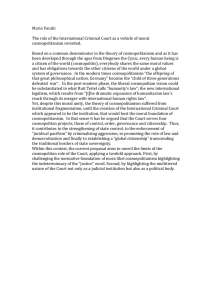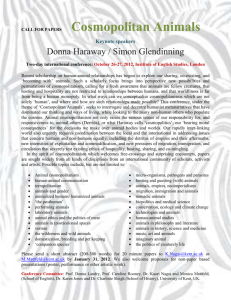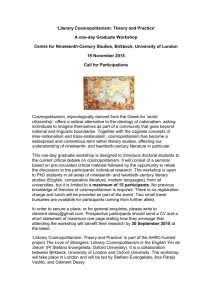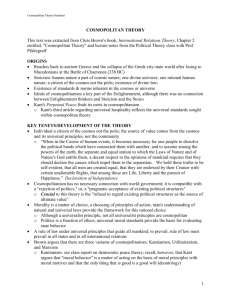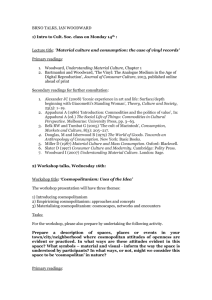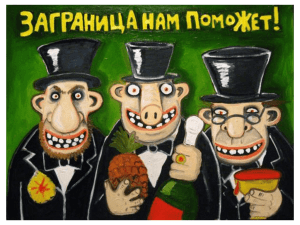New Media, Young Citizens and Civic Cultures: Participation
advertisement
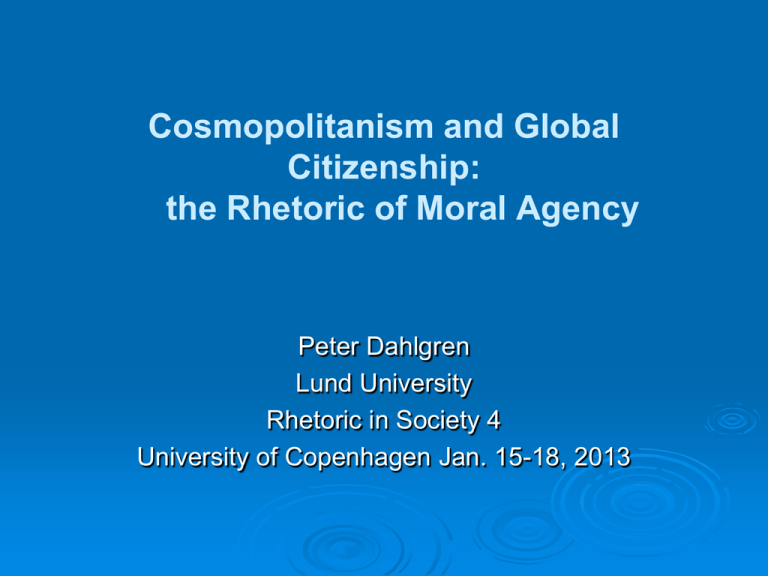
Cosmopolitanism and Global Citizenship: the Rhetoric of Moral Agency Peter Dahlgren Lund University Rhetoric in Society 4 University of Copenhagen Jan. 15-18, 2013 Overview Global civil society and alternative politics: setting the scene Cosmopolitanism: ways of seeing and being The mediapolis: a new kind of public sphere Towards civic cosmopolitanism Contingencies of the web habitus Global civil society and alternative politics A new era Democracies experiencing long-term trends of declining participation Yet also opposite trend: impressive rise in alternative, extra- parliamentarian political activities Very heterogeneous; tend to address broader range of issues, more opportunity for participation, less hierarchical, more inclusive Many involved in transnational issues Global civil society – new phases in history of democracy The cosmopolitan context Globalization – a familiar and contested phenomenon Almost in its wake, the notion of cosmopolitanism has become a new buzzword in the last decade Growing academic literature; a ‘discourse’ emerging Surprisingly, says little about media Also, tends to be oddly removed from ideas of political practice Global issues and activism Transnational civic actors: many goals and strategies Many forms of organization: INGOs, social movements, activist networks, etc. Some mainly ‘civic’ - humanitarian, others cultural, religious (eg, diasporias) Others more explicitly political; alter-globalization movements (eg, WSF) Most display democratic instincts; some anti-democratic (and thus ‘uncivic’) The perspective of political agency Issue of participation: needs a ‘civic identity’, political sense of self (declines and re-emergences of participation…) Civic cultures nourish such identity – knowledge, values/ideals, practices/skills Thus offering socio-cultural foundations of empowered political agency Political practice: must feel meaningful; social, collective contexts Today, use of digital media technologies essential for civic agency Agency as discursive practice At bottom politics enacted via communicative practices Ex: arguing, promoting, recruiting, lobbying, mobilizing, running a meeting, etc, All are manifestations of rhetoric, involve performative skills ( Arendt; Mouffe). A constructionist view; impact of contingencies (enabling and constraining) The subject, and identity, emerge in part via discourses (Themes for another occasion: Why deliberative democracy is over-rated…) Uh oh: excursus on rhetorical vs. discursive horizons (a few signposts…) Conceptually a good deal of overlap; constructionist premises Critical discourse analysis/theory: the inexorability of power relations Discourses are constitutive; builds on theories of subjectivity, identity, social relations Meaning is inherently unstable, contingent, contested Subjects inherently de-centered (the Unconscious, etc.) Subject positions/identities can be ‘overdetermined’ – contradictory – via incompatible discourses Good grief, still more excursus… Discourses embody systems of knowledge, modes of cognitive and normative perceptions They are manifestations of (collective) social practice Analysis: dynamics between text, discursive practice, and social practice/structures. (Fairclough; T.van Dijk; Wodak; Laclau & Mouffe; even Foucault, etc.) Back on track: the basic enigma at hand Cosmopolitanism: strongly moral discourse Yet global activism tends to fall outside; not relevant? Cosmopolitanism needs to connect with agency, with media, with the political Thus: how might we conceive of ‘civic cosmopolitanism’? Cosmopolitanism: moral ways of seeing and being Old concept, new package Socrates, Kant (who seldom left Köningsberg)… Globalization: brings the Other closer Offers varying analytic frame for issues about social perceptions and relations with distant others in the world Helps us to illuminate the normative grounds for such practices Multiple voices: a rhetoric of moral agency One version offers vision of a more just and democratic world order Cosmop. as the only way forward for global issues (eg, D. Held, Archibugi) Others focus on citizenship, rights, inclusion; EU (Habermas, Benhabib) Still others: moral and political philosophy (Nussbaum) Also: socio-cultural conditions for its realisation (Beck; Appiah) Many variations, but lots of moral admonishment High demands on how to be cosmopolitan Required: self-reflexion on own cultural context, origins, and values Scepticism towards the ‘grand narratives’ of modern ideologies Critical distance about the ultimate authority of one’s own culture Predicated on routine encounters with those significantly different from oneself Involves a considerable degree of cultural capital Yet, quest for some mythic ‘new cosmopolitan subject’ is a dead end Troublesome empirical investigations Notions of ‘everyday cosmop.’ have been studied Sobering results - often not too encouraging… Popular discourse about attractive affordances of globalisation, such as travel and culinary diversity Also discourses about ‘cultural loss’ and ‘dilution of national culture’ circulate… A practical link: human rights B. Turner: Cosmop = pacifist values that preclude violence, promote agency and dignity Opposition to human suffering transcends and unites different cultures and epochs Vulnerability of the human body a starting point for commonality and compassion UN Declaration of Human Rights obviously a very cosmopolitan document Yet: this is ‘uncomplicated’. What about minority cultures, etc.? Some critical voices A lot of lofty idealism; charged with political naïveté Utopian tendency - a new world of tolerant and responsible citizens Yet offering little analytic insight on major global divides Few authors see a confrontation with neoliberalism (exceptions: Delanty, Harvey) Delanty claims that conflicts around ‘difference’ are less about culture and more about social and economic questions with political implications Intersections: post-colonialism History of colonialism raises questions of power,privilege Post-colonialism sensitive to how culture and production of meaning always bound up with relations of power Ex: patterns of cultural influences, images of the other, identity processes, integration/assimilation, language use, institution-building, etc. Cosmopolitanism can’t be reduced to power, yet power can’t be ignored An essential tension Universalism (one size fits all?) vs. the local/national One or many cosmopolitanisms? Cosmopolitanism as expression of multiple empirical realities in the world OR:, as a unitary global ideal, with universalist virtues Yet universalist claims vulnerable to critiques of ethnocentrism: an expression of a camouflaged manoeuvre for cultural power The mediapolis: a new kind of public sphere Some media connections The theme of news media and ‘distant suffering’ (Boltanski, Chouliaraki) Touches lightly on cosmopolitanism Does TV news make viewers more cosmopolitan? Pivotal text: Sliverstone’s Media and Morality: On the Rise of the Medialpolis (2006) Media central to late modernity and cosmopolitanism The core concept: mediapolis ‘Mediapolis’: the chaotic, cacophonic space of global media Resides beyond logic, rationality; efficacy always uncertain Multiple voices, inflections images, and rhetoric ‘Post-Habermasian’, ‘post-deliberative’ (even poststructural) Media as ‘environnments’, dense symbolic ecologies Power relations/imbalances shape media industries and media cultures The moral argument Silverstone in line with other cosmop. Theorists; more detailed Media put us in contact with global others; this evokes moral responsibilities Between producers, journalists audiences/receivers Moral demand for reflexivity, recognition of cultural difference Moral response via thinking, speaking, listening; and acting (but how…?) Useful rhetorical/moral idea: ‘proper distance’ within mediapolis From morality to the political Despite its messiness, the mediapolis can still provide resources for judgement: cognitive, aesthetic, and moral He underscores inequities of representation, mechanisms of exclusion Ideological and prejudicial frames of reporting; us and them Says action and meaning contingent on people’s circumstances Silverstone’s is a big step forward, but problems remain Does not really connect with political agency Towards civic cosmopolitanism The impasse Silverstone admits we face difficult questions The public as such does not have a strong meaningful status Empirically it is not politically very efficacious Thought, speech, and action are disconnected and compromised by absence of context, memory, and analytic rigour Increasingly, also by the absence of trust From morality to the political And yet: sees mediapolis as a site for not only moral response But also: potential for practice, enacting agency Yet, the connections remain fuzzy Moral engagement is a pre-requisite – but we must avoid sidelining politics by incantations of universal morality (Dallmayr) Civic cosmopolitanism: a first sketch So how do we envision ‘civic cosmopolitanism’? Global civil society: thin structures for democratic procedures For most citizens, any hope of political agency involves the web in some way (Though not need not be limited to online contexts) The web can enable communicative – and political practices The affordances offer historically unprecedented tools Contingencies of the web habitus The web and democracy: pro Many factors shape the use, non-use, and consequences of the web Huge literature on why or why not the web serves democracy well Easy access, interactive, ‘produsers’ – creative practices Network logic: horizontal civic communication Natural interface with everyday life Can give political engagement a good social anchoring …and con… Political economy, net architecture: centralized corporate control Issues of surveillance, privacy, etc. – Google, Facebook Politics far down on the list of uses; instead: consumption, fun, sociality.. Problems of ‘cocoons’ and ‘echo chambers’, ‘babel’, lack of civility… Many issues compounded when we go global… The online habitus Zizi Papacharissi uses Bourdieu’s notion of habitus Links social structures with agency; people’s daily micromilieu Taken for granted template for values, norms, tastes Durable social dispositions and practices, ‘commonsense’ Connects the individuals in specific ways to the broader ‘fields’ that comprise their worlds Online habitus as a discursive – or rhetorical – ‘nudge/wink’ Affordances + constraints + patterns of practices solidify expectations/norms The web as experiential daily environment: cultural ‘pull’ Attributes: for ex: searchability, shareability, permanent novelty, reflexivity, connectivity, self presentation, expression, revelation…. Markers of identity, (self-)sort people into recognisable categories Facebook: eg, the ‘like button’ – but no ‘dislike button’ Seductions of the solo sphere Patterns of personalised visibility, self-promotion and self-revelation A new habitus of political engagement: cozy private digital setting A retreat into an environment many people have more control over Intertwined with consumption, entertainment, sociality The initial civic impulse morphs into an ironic mode of narcissism Pitfalls – but also potentials The privatized, consumerist online individual congruent with the neo-liberal order… ‘Mundane cosmopolitanising acts’ (Chouliaraki) – click and make a donation When compassion fatigue, etc., sets in: just click to ebay… Nonetheless: the web habitus permits countless forms of political agency Discursive political acts – that can participate in global civil society Two regimes of journalism within the mediapolis -Modernist, mass mediated: claims to objective reporting/accuracy (despite shortcomings) Distinction between facts and emotionality; allows for judgment and moral response Yet, the subject position of spectator is largely cemented -Late modernist, interactive media: claims to experiential witnessing, etc. Allows for networking, potential practice, participation ‘Objectivity’ gives way to a stream of many voices – often emotional Who can we trust on the web…? Manipulation very easy Conclusion: the online mediapolis and civic cosmoploitanism Civic cosmopolitanism can be understood as the potential for political agency, Anchored in the global environment, informed by democratically oriented moral horizons This potential can be actualised via the affordances of the web – and limited by its constraints This is the online sector of the mediapolis. The web must be understood (and analysed) in relation to its shifting contingencies, Not least the attributes of habitus that it promotes.
